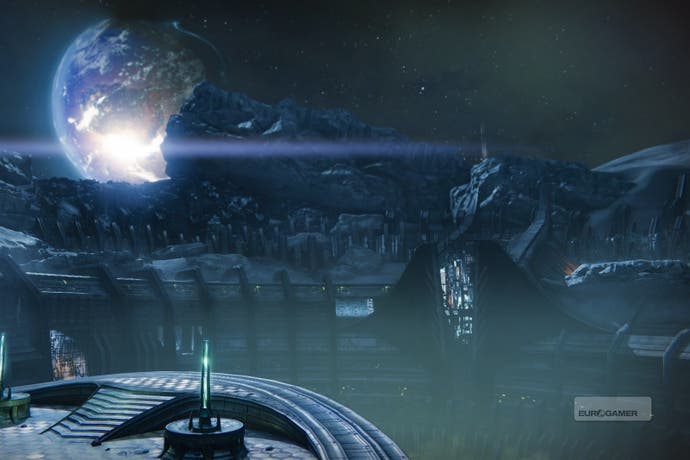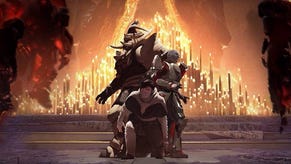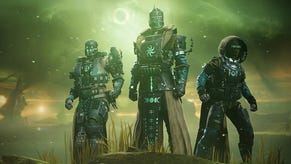Let's talk about Destiny
We meet Bungie in search of answers.
We need to talk about Destiny.
It's not for some lack of trust in developer Bungie. This is the studio that popularised the first-person shooter on console, after all, that alongside Microsoft defined online console gaming with Xbox, that revolutionised matchmaking, that nailed, game after game, that primal satisfaction sparked by a well-aimed grenade, a melee hit from behind, a shotgun to the face.
Let's just say Bungie has earned a little trust. Let's just say Destiny will probably turn out okay in the end.
We need to talk about Destiny because for all the slick on-stage presentations and vi-docs no-one outside of Bungie's Bellevue re-purposed bowling alley base has played the thing.
And so, we're still not quite sure what that the thing is or how, exactly, it works. Eight months after it was announced and a few months from the release of the beta, that's a problem.
Activision Publishing boss Eric Hirshberg calls Destiny a "shared world shooter". That sickly sweet term (that has no chance of sticking, by the way) has its heart in the right place; Destiny is a Bungie first-person shooter with shared world, i.e. MMO, elements, but god forbid you call it an MMO, because it most definitely is not, and it most definitely doesn't have a subscription.
In Destiny you shoot AI-controlled aliens and human-controlled soldiers in the face, like in Halo, but you sometimes, even often, do it with friends - perhaps without knowing. It's an enticing concept, but despite snippets of gameplay footage that show off individual mechanics, how Bungie is sticking this eye-opening genre mash-up together remains a mystery.
So, we sit down with veteran Bungie community chief and senior writer Eric "Urk" Osborne and community cohort David "DeeJ" Dague with a long list of questions that are more about generating understanding than headlines. Like, can you get ganked? Will there be, whisper it, an Auction House? Is Destiny open world? And, the most important question of all: can you fly a space ship?

In a co-op situation within Destiny, do you anticipate the group set-up will follow the established roles we're used to in MMORPGs like World of Warcraft? Will you need someone to tank, for example, and someone to do damage from a distance?
Eric Osborne: People will definitely take on archetypes. That'll naturally evolve. Raids will demand people go in there with pre-baked set-ups, that they understand the people they're playing with. They'll go, 'okay, we need two snipers, a guy with a heavy machine gun...', like the very defined roles, because you know what you're going to run into. We expect those things will evolve as people get on the bleeding edge and start to understand the activity line as they go through. They'll be like, 'oh, we actually don't need two snipers, we need three.'
David Dague: If you have three snipers working together, they're locked into how they're going to play. But if somebody chooses a long-range class and a close-range class and then a flexible, I destroy everything that comes in my path class, they're going to find they have a lot more options for how they can approach the enemies.
Destiny is doing some interesting stuff when it comes to getting players to play together. But how exactly will it work if you don't have friends you play with online at any given moment? What's Destiny's Looking for Group mechanic?
Eric Osborne: I've seen this happen in the Lab a bunch: I'm running through a space by myself, I'm playing the story, then move through a crossroads space and I hear shots ring out and see some Vex get picked apart and I look over and it's like, 'oh, it's Andreas!' It's such a cool moment. He just winked into my world. He was there doing his own thing, then we roam around, do a bunch of stuff and then go our own way.
Sometimes deciding about forming a party is just about seeing other actors in the world and realising, 'oh, that's not an actor, that's my friend or another person.' It has these nice collisions, much in the same way - and people have picked up on this in the past - like a Journey sort of experience, where you move through the game and you have these little delightful moments when people come together and work together and then they go about their separate ways without any sort of negativity or penalty.
We give players the option. You don't have to jump into a public event if you don't want to. Like if you've done it a bunch of times, or you know you're on a very specific story mission, or you just want to jump in and do some competitive multiplayer, that's totally your option.
David Dague: We understand social gaming can be daunting for certain players, which is why a lot of people tell us, I don't want to be forced to play with someone. You make a very conscious decision to invite someone into your fireteam. And when you do that, those are the people whose voices you will hear. People will say, as I move through this world, I don't want other people's chatter to ruin my immersion. The only people who I want to speak to or listen to are the people who I make a direct connection with. I decide to be on a fireteam with you. We are now speaking to each other.
So you won't hear chat from other players unless they're in your fireteam?
Eric Osborne: We're able to define systems, and a lot of this is still in an iterative process, but finding the line between giving those players control over, 'do I want to hear that or not?', is important. If you look at some of our past games you'll get a pretty good idea of what we can do with those sort of systemic things, to allow people to opt into what they want and choose the options that suit their play style.
Will I be able to play through Destiny on my own and work through the content without having to group up with other players?
Eric Osborne: You can't turn the world off, right? But if you want to draw a bright line from point A to point B, or spend a weekend just indulging the story, bingeing through and treating it like an on-demand experience, absolutely.
When you're in those cinematic moments, the story with the beginning, middle and an end, those are absolutely private. So when you move into those spaces you'll know, 'if I bring a fireteam in they're here with me, and if I don't I'm moving into this space and it's becoming my journey.'
We want that to be seamless, but we also want players to understand where those spaces are. There isn't a lobby or loading, but you can identify, 'okay, when I'm here I'm going to see other players and run into other people, and when I go over here, it's me.'
"We're building a first-person shooter. It's not a space sim."
Bungie senior writer and head of community Eric Osborne
How many people can play together at once?
Eric Osborne: We're still defining what those boundaries are internally. We're playing it every day. We're definitely not going for the thousand player chaos experience. We're certainly going to err on the side of making sure everybody feels empowered and they have a lot of agency. When you fight the tank you want to feel like you're contributing to that battle and that your shots matter, and that you have to react and smartly avoid its fire and think about the other Fallen that are dropping in left and right to flank you, and try to stay alive.
The demo we showed at E3 was seven players in there at the same time. The moon content we showed in the trailer was sourced from a strike, which is a co-operative activity you can play over and over again, and that was three players. Three seems to be the sweet spot we're finding for the smaller co-operative experiences, and then we'll start talking about public spaces - that'll vary - we'll talk about social space - that'll vary as well. Competitive multiplayer won't be three players total! And neither will a raid.
We've seen glimpses of space ships heading off to other planets in the solar system. How do you transition from home base to other areas? Do you simply watch a cinematic in which your space ship flies off? Can you fly a space ship?
David Dague: Space exploration is obviously a huge theme in this game. Your player space ship is another extension of your character. It's something you'll upgrade and customise. It'll help tell your story of where you've been and what you've accomplished. But when players imagine their experiences in playing Destiny, they should look forward to a boots on the ground adventure.
Eric Osborne: It's a shooter, right? We're building a first-person shooter. It's not a space sim. Your ship is what's taking you from planet to planet to planet, and as you push through the world itself and through that content, you're opening it up as you go. In some cases we want you to feel like you're the first person there. And so that idea of space exploration and this new frontier opening up is vital to the experience.
But we're not trying to accurately create a simulation. We wouldn't recreate the whole of Venus because, well, one, it would take you forever to go around and you would die on the surface, right? And you would never experience a sunset. So there are few things we're going to take liberties with to make sure the core action experience is fun.
How will competitive multiplayer work? Do you select an option to go into competitive multiplayer or is it part of the emergent gameplay experience we've already seen?
Eric Osborne: It's not emergent in the sense where if you're running through the world on your way to a destination or another activity, somebody can just force you into a PvP match.
You can't get ganked?
Eric Osborne: You can't get ganked. You're always electing to jump into that activity. Some of the activities in the game will be rooted in the world itself, like, literally inside of the world itself, where you're going into a place. Others will be woven into the fabric of the story but will have a different entry point into that space. We want to make sure we're building scenarios where players can choose the activity they feel like they want to do right now, but also that it feels like it's part of the overall universe and it has consequence and meaning in the world.
Competitive multiplayer is a huge focus for the team. We love it. We play it at launch weekly. We fight about it. We constantly go back and forth. The perspectives vary wildly inside the studio. But it's already got to the point where it's really fun and it's really about tweaking and iterating and playing it every day and finding that spot we think is unique but also feels familiar for those who are into competitive multiplayer that's skill-based, 'I'm better than you not necessarily because of the gear I have but because I'm better than you.'
And then another experience where you can go with your friends and have a more social competitive encounter that's not just like, white knuckle, skin of your teeth, everbody's heart pounding, oh my god, which some players really enjoy. That's more narrative driven - my buddies and I had an absolute blast. We lost half our games and won half our games but they were all amazingly fun.
David Dague: The Guardians you encounter on a story mission will be your allies. The Guardians are united as a force for good. But that doesn't mean they don't enter a conceptual arena and bump heads to see who's the best. But those will be very separate activities.
"The Guardians you encounter on a story mission will be your allies. But that doesn't mean they don't enter a conceptual arena and bump heads to see who's the best. But those will be very separate activities."
Bungie community manager David Dague
Does Destiny have an in-game economy? What's the currency?
Eric Osborne: There's fictional skinning around everything in the game. We're not digging deep into the economy and all the different vendors and things you can do in the world. In the near future we may.
But do you plan a system to allow players to sell items, like an Auction House?
Eric Osborne: If it's among other players, we're not talking about anything like that itself. If you're talking about in-game currency - not real dollars but in-game currency - we absolutely will have vendors in the game where you can buy weapons. But that's just one of the ways you can get weapons in the game. You can go and find them in the world, in treasure chests, you can earn them in activities and enemies, and you can go to the city, where you repair, refuel and rearm. But that's going in and buying gear.
I'm talking more of a system like in Diablo 3, where you can put loot on an Auction House and players can bid for it with virtual gold or real money gold.
Eric Osborne: We're not going in-depth on any of that kind of stuff, and I'm not smart enough to talk about it!
You've talked about your home base. What exactly can you do there? Is there the equivalent of a guild system? Is there player housing?
Eric Osborne: We want it to feel like a real place where you can tell stories and hang out with friends and show off your gear, maybe do a little pea-cocking and walk around. You can go into third-person and see your character. It's important you can see the gear. Typically through the game, as a first-person shooter, the gear you've earned doesn't have a visual representation for you unless you're going into third-person for super abilities. We're using those liberally as well. You can see your character more often than you normally would. And of course in cinematics you'll see your character.
But we want the social spaces to be places people go and maybe just stare at the Traveller in the sunset, or maybe go into a certain district and try to understand a little bit more about the world, or go do vending, or meet with other players. All that stuff.
Can you leave the city and explore the surrounding area in an open world sense?
Eric Osborne: Your primary space on earth is the Tower, which is where Guardians go. It's the overwatch of the city, where you're looking out and defending the city. It's also where the military districts and and where the hangers are for your ships. It's a sort of a separate class. You're not just a citizen. You're a Guardian. You're actually charged with going out there. You've elected to become a hero.
There are definitely places on earth and the other worlds that are built for exploration, that are large spaces. When we show off the moon, for example, that's one activity line, a strike that begins in the world then gets more focused as you go in and becomes a private experience. But we're only showing a small slice of that. In a lot of those places, if you go left or right there's a whole other scenario or set of activities you can do. The Cosmodrome stuff we showed off at E3 is a tiny fraction of that space.
We shy away from open world. They are massive spaces and there's a tonne of stuff to do in them. And there are enemies to fight. And you can absolutely go out there and get lost. But for a lot of players, just like MMO, open world has a separate connotation. It implies a style or genre of game, as opposed to an activity.
"We shy away from open world. For a lot of players, just like MMO, open world has a separate connotation. It implies a style or genre of game, as opposed to an activity."
Eric Osborne
On the MMO comparison, Destiny is described as a shared world shooter. Do you face a challenge of communication in that Destiny isn't an MMO in the traditional sense, but has MMO elements?
Eric Osborne: Yeah. That's why we started slow and with the action kernel. We want to get across, hey, it's an action game. It's a shooter. This is what we do. This is what we love making. If you enjoy the stuff we've made in the past, you're absolutely going to have that type of experience. The rest we layer around that. That's where we're at the bleeding edge.
How do we make the things we love from an action RPG and pull them into this thing and make this genre feel unique? And how do we take things from an open world and pull them in? And how do we take things from an MMO and pull them in without both confusing the shit out of everyone when we try to tell them what it is?
It feels like a cop-out to say, well, you have to play it to understand it, but in some ways that is actually true. But there are some negative things around it. The first question you get when they're like, 'oh, it's an MMO', is, 'well what's the subscription fee?'
David Dague: Destiny is a first-person shooter, but you will definitely play a role in this game. You will definitely be able to explore. People will find Bungie is committed to providing players with feedback. And one of the pieces of feedback you'll always be given is, what can you do next? The world will be always giving you an invitation to come and experience something specific, be it an activity with other people or a piece of the story. We want to make that very obvious so people don't feel lost and just wandering looking for something to happen.
How will that manifest itself in the game? How will Destiny suggest to players they should perhaps try this next?
Eric Osborne: In top secret unannounced ways!
It's a pretty natural progression, but the complexities of the different genre stuff we're blending in makes it a little bit difficult for some people to grasp.
David Dague: The game will be different things to different people. To try to slap some slick acronym on top of it... I don't want to pigeon-hole people's expectations too much. To some people it'll be a storybook. To some people it'll be an arena. To other people it'll be a stage. We want to create a world where all of those people collide and drag each other out of their comfort zones and invite them to experience other things.
Just by the lore of, I am unique from you, if you want a little bit of what I have to infuse it into your build, let me bring you into where I like to play, and then I'll come and go with you where you like to play. And then they can mix and match and share with each other. To try to describe that, to try to encompass all of that...
I think a lot of people are pretty satisfied when we say it's a Bungie action game with activities for every mood.
The time for talking is over, and we've since been hands-on with Bungie's new game.




















